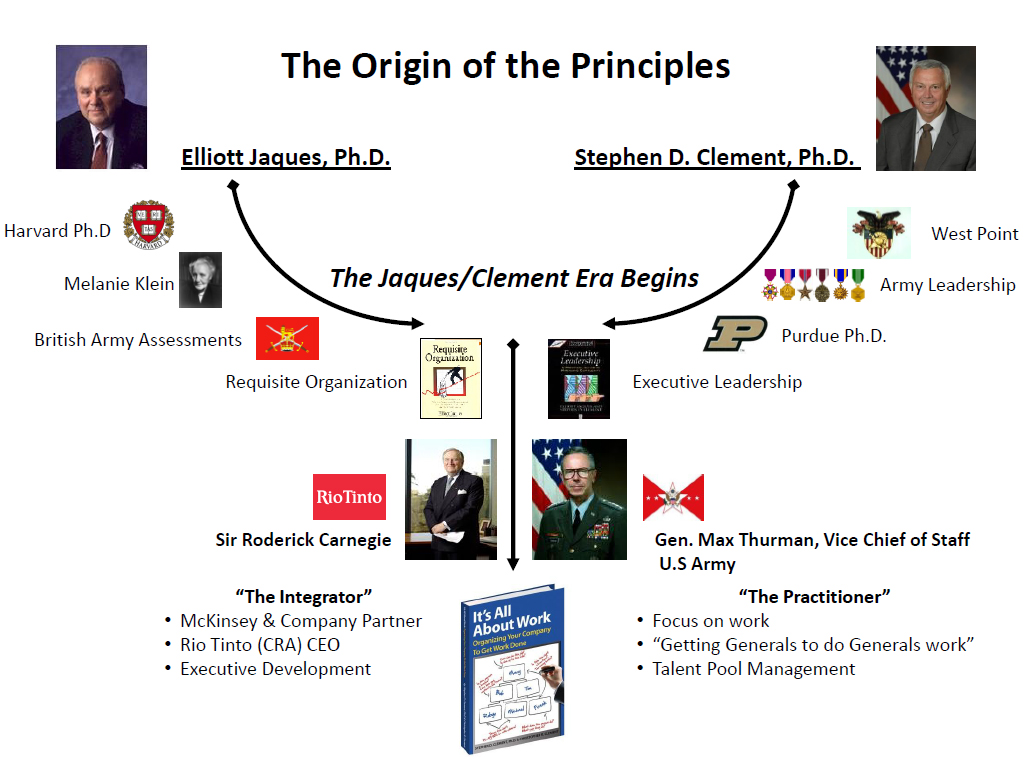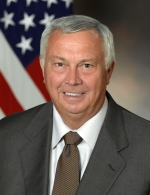Detailed biography and experience
|
|
Stephen D. Clement, Ph.D.
The Society celebrates Dr. Clement for his lifetime contributions to the field of organization design, to the Society, and to his clients.
After 35 years, Steve continues to make important and varied contributions to the development of organization design based on levels of work complexity and human capability. He worked closely with Elliott Jaques, then developer of Stratified Systems Theory, Sir Roderick Carnegie, CEO of CRA in Australia, and General Maxwell Thurman, Vice Chief of Staff for the US Army and the Army Reseach Center to articulate the practical implementation steps for the theoretical concepts set down in Jaques’s Theory of Bureaucracy in 1978. His contributions include foundational research, authoring foundational books, and clinical practice - developing methods as he consulted.
A pillar of strength for the Society, he advised on the founding the Society in 2003, recommended producing biennial world conferences, and has strongly supported the society's activities by serving as a Senior Fellow, presenting and bringing senior executives to our conferences, writing for our book and developing substantial materials for our web site. Our society would not be what it is today without him.
And he has contributed to his clients, first central to redesign of many units of the US Army both uniformed and non uniformed, and then to Fortune 100 companies through his firm, Organizational Design Inc.
He clearly one of a handful of elite organizational design thought leaders and practitioners in the field and an outstanding citizen in his professional association.
|

Biography
Dr. Clement graduated from the United States Military Academy and was commissioned as an Artillery officer in 1965. As a Ranger in Vietnam he learned, first hand, the unique importance of battlefield leadership. Upon his return to the United States he began studies at Purdue University, earning a MS in Industrial Relations and a Ph.D. in Organizational Communication. Following graduate school, he then began his journey as an organizational and leadership expert in the U.S. Army, at the United Stated Military Academy at West Point. There, Dr. Clement taught courses on leadership and management and became the Director of Research within the Leadership Department. Over the course of his distinguished military career, Dr. Clement designed and developed the U.S. Army’s leadership development programs, many tenets of which, even today, serve as leadership doctrine for Army Soldiers and Officers worldwide. Towards the latter part of his military career, Dr. Clement pioneered in identifying the underlying set of organizational principles that functioned as the theoretical base under-pinning the Army’s leadership programs. In short, he realized leadership does not occur in a vacuum, but rather in a social setting (i.e., organizational structure and hierarchy).
While developing the Army's leadership programs, Dr. Clement came to meet Dr. Elliot Jaques. Dr. Jacques’ background in human nature and social organizations coupled with Dr. Clement’s background in leadership and military organizations led to a dynamic partnership. Together, their work aroused the interest of the CEO of a large mining company in Australia, CRA. In 1985, Dr. Clement retired from the United States Army after 20 years of service to found Organizational Design, Inc. ODI’s original charter was to pursue organizational design work through a partnership with Dr. Jaques both at CRA and the US Army. Sir Roderick Carnegie, then CEO of CRA Australia, initiated a full scale implementation and subsequent total reorganization of CRA based on the work of Dr. Clement and Dr. Jacques. This work led to the authoring of two books: Requisite Organization published in 1989 in which Dr. Clement was a significant contributor, followed by Executive Leadership published in 1991 in which Dr. Clement and Dr. Jaques were co-authors. These two long-term field projects (U.S. Army and CRA) and these two books (Requisite Organization and Executive Leadership) form the basis of Organizational Design’s approach to organizations.
In subsequent years, this set of basic organizational design principles has proven to be central in achieving dramatic increases in the efficiency and effectiveness of contemporary business and government organizations. As a consultant to industry and government, Dr. Clement specializes in the application of the design principles outlined in his latest book (It’s All About Work) to the organization of work, including key work related processes and the underlying leadership and management skills required to perform such work effectively. Substantial improvements in productive effectiveness have occurred as a direct result of Dr. Clement’s organizational interventions (e.g., 30% cost reductions, 6% annual productivity increases over a ten year period, etc.).
Dr. Clement continues to provide his expertise to the Fortune 500 organizations, as well as the U.S. Army. With more than 50 years of experience in leadership and management, in both government and corporate arenas, Dr. Clement provides a unique and time-tested vision as to how an organization should be structured around the work. He has been instrumental in transforming many organizations to more effectively meet the needs of a rapidly changing economic and warfigthting environment.
Dr. Clement’s awards and decorations include several battlefield medals to include e.g., The Soldiers Medal, The Bronze Star Medal, The Meritorious Service Medal, The Air Medal, The Army Commendation Medal for Heroism as well as several distinguished service awards e.g., the Legion of Merit, Military Medical Merit and in 2007, the United States Secretary of the Army Public Service Award.
Dr. Clement has been a longtime member of the Army Science Board (ASB) and former chair of the Innovation Panel for the ASB.
Organizational Design Inc.
Dr. Stephen D. Clement founded Organizational Design Inc. in 1985 as a vehicle to allow him to begin a research partnership with Dr. Elliott Jaques.In subsequent years ODI has been engaged by a multitude of organizations in its nearly 30 years of practice. From small organizations with a handful of employees to Fortune 100 Corporations to the U.S. Army.
CRA and the U.S. Army were the first clients of Organizational Design Inc. This multi-year collaboration fostered the development and research that eventually lead to the authoring of two books, Requisite Organization and Executive Leadership.
The early 90’s involved work with corporate manufacturing organizations, notably Whirlpool and it’s international partners. In addition, ODI began a long project with the U.S. Army Medical Command marking the team’s first foray into the medical world. ODI then worked with other manufacturing organizations, retail organizations and industrial service organizations through the 90’s until 2001.
In 2000, while the ODI team continued solid growth assisting some of the world’s leading corporations we began some small projects and training programs for the U.S. Army. The events of 9/11 drastically altered the direction of ODI and its personnel. The Secretary of the Army, the Pentagon and Joint Chiefs of Staff immediately engaged ODI in several large scale organizational studies. The U.S. Army underwent a radical restructuring lead by the ODI team. ODI grew in size and scope to meet the size and time demands of the U.S. Army, conducting work in dozens of countries and interviewing thousands of military and civilian employees.
As the large scale projects with the U.S. Army began to wind down the economic crisis began to increase the demand for our services in the corporate world. ODI saw a gradual return to the Fortune 100 client base and was engaged by defense contractors both of which faced tremendous strategic uncertainty. In addition, the ODI team began to consult and assist small business.
Currently ODI focuses it’s efforts on three primary markets, Government/Military, Corporate Organizations and Small/Medium Business.






